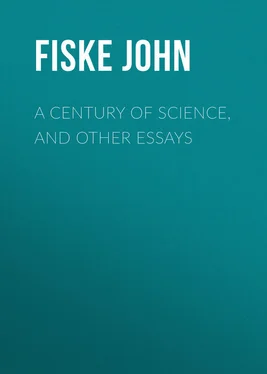John Fiske - A Century of Science, and Other Essays
Здесь есть возможность читать онлайн «John Fiske - A Century of Science, and Other Essays» — ознакомительный отрывок электронной книги совершенно бесплатно, а после прочтения отрывка купить полную версию. В некоторых случаях можно слушать аудио, скачать через торрент в формате fb2 и присутствует краткое содержание. Жанр: foreign_antique, foreign_prose, на английском языке. Описание произведения, (предисловие) а так же отзывы посетителей доступны на портале библиотеки ЛибКат.
- Название:A Century of Science, and Other Essays
- Автор:
- Жанр:
- Год:неизвестен
- ISBN:нет данных
- Рейтинг книги:3 / 5. Голосов: 1
-
Избранное:Добавить в избранное
- Отзывы:
-
Ваша оценка:
- 60
- 1
- 2
- 3
- 4
- 5
A Century of Science, and Other Essays: краткое содержание, описание и аннотация
Предлагаем к чтению аннотацию, описание, краткое содержание или предисловие (зависит от того, что написал сам автор книги «A Century of Science, and Other Essays»). Если вы не нашли необходимую информацию о книге — напишите в комментариях, мы постараемся отыскать её.
A Century of Science, and Other Essays — читать онлайн ознакомительный отрывок
Ниже представлен текст книги, разбитый по страницам. Система сохранения места последней прочитанной страницы, позволяет с удобством читать онлайн бесплатно книгу «A Century of Science, and Other Essays», без необходимости каждый раз заново искать на чём Вы остановились. Поставьте закладку, и сможете в любой момент перейти на страницу, на которой закончили чтение.
Интервал:
Закладка:
The years when Youmans was travelling and lecturing were the years when the old lyceum system of popular lectures was still in its vigour. The kind of life led by the energetic lecturer in those days was not that of a Sybarite, as may be seen from a passage in one of his letters: "I lectured in Sandusky, and had to get up at five o'clock to reach Elyria; I had had but very little sleep. To get from Elyria to Pittsburg I must take the five o'clock morning train, and the hotel darky said he would try to waken me. I knew what that meant, and so did not get a single wink of sleep that night. Rode all day to Pittsburg, and had to lecture in the great Academy of Music over footlights… The train that left for Zanesville departed at two in the morning. I had been assured a hundred times (for I asked everybody I met) that I could get a sleeping-car to Zanesville, and when I was all ready to start I was informed that this morning there was no sleeping-car. By the time I reached here I was pretty completely used up."
Such a fatiguing life, however, has its compensations. It brings the lecturer into friendly contact with the brightest minds among his fellow countrymen in many and many places, and enlarges his sphere of influence in a way that is not easy to estimate. Clearly, an earnest lecturer, of commanding intelligence and charming manner, with a great subject to teach, must have an opportunity for sowing seeds that will presently ripen in a change of opinion or sentiment, in an altered way of looking at things on the part of whole communities. No lecturer has ever had a better opportunity of this sort than Edward Youmans, and none ever made a better use of his opportunity. His gifts as a talker were of the highest order. The commonest and plainest story, as told by Edward Youmans, had all the breathless interest of the most thrilling romance. Absolutely unconscious of himself, simple, straightforward, and vehement, wrapped up in his subject, the very embodiment of faith and enthusiasm, of heartiness and good cheer, it was delightful to hear him. And when we join with all this his unfailing common sense, his broad and kindly view of men and things, and the delicious humour that kept flashing out in quaint, pithy phrases such as no other man would have thought of, and such as are the despair of any one trying to remember and quote them, we can seem to imagine what a power he must have been with his lectures.
When such a man goes about for seventeen years, teaching scientific truths for which the world is ripe, we may be sure that his work is great, albeit we have no standard whereby we can exactly measure it. In hundreds of little towns with queer names did this strong personality appear and make its way and leave its effects in the shape of new thoughts, new questions, and enlarged hospitality of mind, among the inhabitants. The results of all this are surely visible to-day. In no part of the English world has Herbert Spencer's philosophy met with such a general and cordial reception as in the United States. This may no doubt be largely explained by a reference to general causes; but as it is almost always necessary, along with our general causes, to take into the account some personal influence, so it is in this case. It is safe to say that among the agencies which during the past fifty years have so remarkably broadened the mind of the American people, very few have been more potent than the gentle and subtle but pervasive work done by Edward Youmans with his lectures, and to this has been largely due the hospitable reception of Herbert Spencer's ideas.
It was in 1856 that Youmans fell in with a review of "Spencer's Principles of Psychology," by Dr. Morell, in "The Medico-Chirurgical Review." This paper impressed him so deeply that he at once sent to London for a copy of the book, which had been published in the preceding year. It will be observed that this was four years before the Darwinian theory was announced in the first edition of the "Origin of Species." 15 15 See above, p. 49.
After struggling for a while with the weighty problems of this book, Youmans saw that the theory expounded in it was a long stride in the direction of a general theory of evolution. His interest in this subject received a new and fresh stimulus. He read "Social Statics," and began to recognize Spencer's hand in the anonymous articles in the quarterlies in which he was then announcing and illustrating various portions or segments of his newly discovered law of evolution. One evening in February, 1860, as Youmans was calling at a friend's house in Brooklyn, the Rev. Samuel Johnson, of Salem, handed him the famous prospectus of the great series of philosophical works which Spencer proposed to issue by subscription. Mr. Johnson had obtained this from Edward Silsbee, who was one of the very first Americans to become interested in Spencer. The very next day Youmans wrote a letter to Spencer, offering his aid in procuring American subscriptions and otherwise facilitating the enterprise by every means in his power. With this letter and Spencer's cordial reply began the lifelong friendship between the two men. It was in that same month that I first became aware of Spencer's existence, through a single paragraph quoted from him by Lewes, and in that paragraph there was immense fascination. I had been steeping myself in the literature of modern philosophy, starting with Bacon and Descartes, and was then studying Comte's "Philosophie Positive," which interested me as suggesting that the special doctrines of the several sciences might be organized into a general body of doctrine of universal significance. Comte's work was crude and often wildly absurd, but there was much in it that was very suggestive. In May, 1860, in the Old Corner Bookstore in Boston, I fell upon a copy of that same prospectus of Spencer's works, and read it with exulting delight; for clearly there was to be such an organization of scientific doctrine as the world was waiting for. It appeared that there was some talk of Ticknor & Fields undertaking to conduct the series in case subscriptions enough should be received. Spencer preferred to have his works appear in Boston; but when in the course of 1860 his book on "Education" was offered to Ticknor & Fields, they declined to publish it, – which was, of course, a grave mistake from the business point of view. Youmans, however, was not sorry for this, for it gave him the opportunity to place Spencer's books where he could do most to forward their success.
Some years before, during his blindness, his sister had led him one day into the store of Messrs. D. Appleton & Co. in quest of a book, and Mr. William Appleton had become warmly interested in him. I believe the firm now look back to this chance visit as one of the most auspicious events in their annals. Youmans became by degrees a kind of adviser as regarded matters of publication, and it was largely through his far-sighted advice that the Appletons entered upon the publication of such books as those of Buckle, Darwin, Huxley, Tyndall, Haeckel, and others of like character; always paying a royalty to the authors, the same as to American authors, in spite of the absence of an international copyright law. As publishers of books of this sort the Appletons have come to be preëminent. It is obvious enough nowadays that such books are profitable from a business point of view; but thirty years and more ago this was by no means obvious. We Americans were terribly provincial. Reprints of English books and translations from French and German were sadly behind the times. In the Connecticut town where I lived, people would begin to wake up to the existence of some great European book or system of thought after it had been before the world anywhere from a dozen to fifty years. In those days, therefore, it required some boldness to undertake the reprinting of new scientific books; and none have recognized more freely than the Appletons the importance of the part played by Youmans in this matter. His work as adviser to a great publishing house and his work as lecturer reinforced each other, and thus his capacity for usefulness was much increased.
Читать дальшеИнтервал:
Закладка:
Похожие книги на «A Century of Science, and Other Essays»
Представляем Вашему вниманию похожие книги на «A Century of Science, and Other Essays» списком для выбора. Мы отобрали схожую по названию и смыслу литературу в надежде предоставить читателям больше вариантов отыскать новые, интересные, ещё непрочитанные произведения.
Обсуждение, отзывы о книге «A Century of Science, and Other Essays» и просто собственные мнения читателей. Оставьте ваши комментарии, напишите, что Вы думаете о произведении, его смысле или главных героях. Укажите что конкретно понравилось, а что нет, и почему Вы так считаете.












